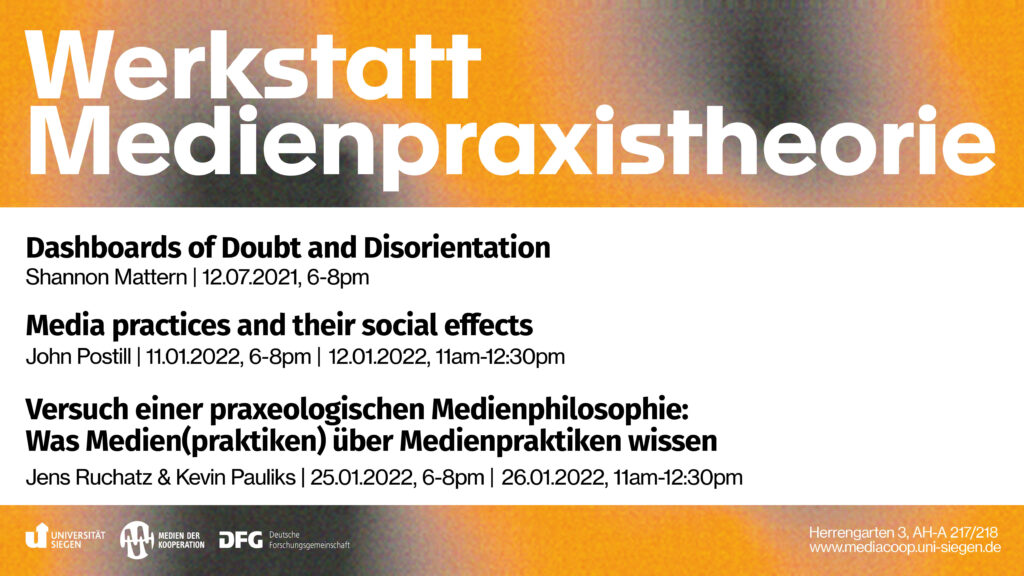Werkstatt Medienpraxistheorie Winter 2021/22

Vorträge und Workshops im Wintersemester 2021/22:
Dienstags um 17:00 (Vortrag)
Mittwochs um 11:00 (Workshop)
Alle Veranstaltungen finden hybrid statt.
In this era of upheaval and uncertainty, data dashboards have proliferated, promising clarifying oversight of everything from COVID infections and vaccinations, to the removal of white supremacist and colonialist statuary, to energy expenditures and climate change mitigation efforts. Dashboards crystallize states’, municipalities’, activists’, and corporations’ approaches to epistemological and affective governance by parceling the knowledge required for decision-making and calibrating stakeholders’ panic and pride in “progress.” Yet for all their promises of omniscient command, dashboards also manifest doubt and disorientation. In this talk we’ll examine a variety of recent dashboard and “control center” projects – both functioning and speculative examples – and consider how they reveal, perhaps inadvertently, the uncertainty and ambiguity underlying the data that illuminate their screens, the intelligence they cultivate, and the modes of governance that intelligence ostensibly inspires.
Shannon Mattern is a Professor of Anthropology at the New School for Social Research. Her writing and teaching focus on archives, libraries, and other media spaces; media infrastructures; spatial epistemologies; and mediated sensation and exhibition. She is the author of The New Downtown Library: Designing with Communities; Deep Mapping the Media City; Code and Clay, Data and Dirt: 5000 Years of Urban Media, all published by University of Minnesota Press; and A City Is Not a Computer, published by Princeton University Press. She also contributes a regular long-form column about urban data and mediated infrastructures to Places Journal. In addition, she serves as president of the board of the Metropolitan New York Library Council and regularly collaborates on public design and interactive projects and exhibitions. You can find her at wordsinspace.net.
In this workshop we discuss John Postill’s lecture and forthcoming paper that draw from the practice theory and media anthropology literature, as well as from a range of empirical studies, including Postill’s own anthropological research in Malaysia and Spain, to discuss the effects of media-related practices in people’s social worlds. Postill argues that these social effects come in two main varieties – mediatising effects and worlding effects – and that this area is ripe for further media ethnographic work, so long as we overcome our customary aversion to the notion of media effects.
John Postill gained a PhD in Anthropology at University College London in 2000. He specialises in the study of media and sociocultural change and to date has done fieldwork in Malaysia, Indonesia and Spain. He currently lectures at the School of Media and Communication, RMIT University, Melbourne, where he was previously a Vice-Chancellor’s Senior Research Fellow. His publications include The Rise of Nerd Politics (2018), Digital Ethnography (2016), Localizing the Internet (2011), Theorising Media and Practice (2010) and Media and Nation Building (2006). He is presently researching the ‚anti-woke‘ movement and writing his first novel, a work of social science fiction titled Life of Piñas. He occasionally (re)tweets as @JohnPostill.
Wie unsicher Bestimmungen sind, was ein Medium ausmacht, ist spätestens seit den Anfängen der Digitalisierung offensichtlich geworden. Zuvor gesteckte Mediengrenzen, wie z. B. von Fotografie, Film und Fernsehen, scheinen im medialen Raum des Digitalen zu verschwimmen. Deswegen wird immer häufiger der Blick von den medialen Formen und ihrer Prägekraft hin zu den Medienpraktiken verschoben, also auf das, was Menschen mit Medien machen. Als methodisches Rezept wird dann eine Ethnographie verordnet, die vorschreibt, Akteure bei ihrem Tun zu beobachten oder über ihr Tun zu befragen. Die formanalytischen Bezugspunkte der Medienwissenschaft – ihre eigenen Kompetenzen und Praktiken – werden von solchen non-representational methodologies konsequent ausgeklammert. Dem möchten wir entgegenhalten, dass Medien – im Sinne einer praxeologisch gewandten Medienphilosophie – nicht weniger verlässlich über ihre Praktiken Auskunft geben als Akteure. Wenn wir uns das Ziel setzen, Medien darauf hin zu befragen, was sie von ihren eigenen Medienpraktiken wissen, dann gewinnt dadurch zugleich auch die Bestimmung des Medialen an Kontur und Konkretion.
Jens Ruchatz ist Professor für Medienwissenschaft mit dem Schwerpunkt Audiovisuelle Transferprozesse an der Philipps-Universität Marburg und stellvertretender Sprecher der DFG-Forschungsgruppe (FOR2288) „Journalliteratur: Formatbedingungen, visuelles Design, Rezeptionskulturen“ an den Universitäten Bochum, Marburg und Köln. Er leitet die Forschungsprojekte „Fragmentwanderungen im Medienvergleich: Fotografien in Zeitschrift und Buch im 20. Jahrhundert“ und „Bildförmige Bildkritik in Sozialen Medien. Explizites und implizites Theoretisieren des digitalen Bildes“. Er forscht unter anderem zu Fotografie in all ihren Materialitäten, zur Medialität der Zeitschrift, zu kulinarischen Medien und Fernsehserien.
Kevin Pauliks, M.A. ist wissenschaftlicher Mitarbeiter im DFG-Forschungsprojekt „Bildförmige Bildkritik in Sozialen Medien. Explizites und implizites Theoretisieren des digitalen Bildes“ im Rahmen des Schwerpunktprogramms „Das digitale Bild“ an der Philipps-Universität Marburg. Zuvor arbeitete er an der Bergischen Universität Wuppertal am Lehrstuhl für Allgemeine Soziologie. Von 2011 bis 2016 studierte er an der Philipps-Universität Marburg Medienwissenschaft und Soziologie. Er promoviert zu den Medienpraktiken von Internet-Memes in der Werbung.